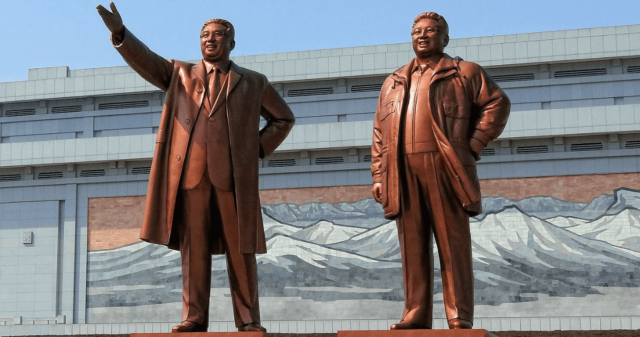
North Korea releases thousands of prisoners to celebrate former leader’s birthday Visitors bowing for North Korean leaders Kim Il-sung and Kim Jong-il in Pyongyang, North Korea. (Bjørn Christian Tørrissen -http://bjornfree.com/kim – Released)
This article was originally published by Radio Free Asia and is reprinted with permission.
North Korea released several thousands of prisoners as part of a celebration for a major holiday, a move that prompted joyful family reunions but also alarm about the abuse many former inmates appear to have suffered while in captivity, sources in the country told RFA.
The holiday on Wednesday marked what would have been former leader Kim Jong Il’s 80th birthday. After his death in 2011, his son and successor, Kim Jong Un, declared his father’s birthday to be a national holiday called the “Day of the Shining Star,” elevating it to the same level as the “Day of the Sun,” the birth anniversary of the progenitor of the Kim Dynasty, national founder Kim Il Sung.
The North Korean prison system is well known to be incredibly brutal. Former inmates who have escaped the country have said prisoners are poorly fed, live in crowded cells, and are subjected to torture, backbreaking labor and sexual abuse.
Being released from a North Korean prison is reason to celebrate for the inmate and his or her family. But a resident of the northeastern province of North Hamgyong told RFA’s Korean Service that many of the prisoners released ahead of the Day of the Shining Star had suffered so badly that they appeared to be near death.
“Everyone was shocked when those who were released by the amnesty were severely malnourished and barely able to walk,” said the source, who requested anonymity to speak freely. “Some prisoners were unable to move, so their families had to bring them home on stretchers.”
The amnesty did not include political dissidents or criminals convicted of drug offenses or violent crimes such as robbery and murder, according to the source. It had been rumored for several months, and families eagerly anticipated the return of their imprisoned relatives.
“They had high hopes, they expected a five-year sentence reduction, but only a three-year reduction was announced, so, many prisoners who have more than three years remaining will have to complete the remainder of their sentences before they are released,” said the source.
“One-thousand prisoners were released from Hamhung prison, out of a total prison population of 6,000,” he said.
Prisoners headed home from all the country’s major prisons, including in the cities of Hamhung, Sariwon and Kaechon, and Chungsan county in South Pyongan province, west of the capital Pyongyang, a resident of North Hwanghae province, south of the capital, told RFA.
“An 18-year-old prisoner became big news when she said after her release from Sariwon prison that her time in jail was the first time in her whole life that she had eaten three meals per day. They gave her three meals of steamed corn,” the second source told RFA.
“She had lost her parents at a young age and was imprisoned for theft after living as a homeless street beggar,” the second source said.
Many people are concerned now that the woman has been released to a situation where she is homeless and jobless, the second source said.
“She has no home or family, so the head of the local government office and a local party secretary took her in. I am worried about how she will live in the future. She never went to school and does not know how to write or read because she was a street beggar,” she said.
“This year’s amnesty was done on a fairly large scale, with the government touting it as a tremendous show of mercy from the Marshal,” the second source said, referring to Kim Jong Un.
According to the source, of the 1,000 prisoners in Sariwon prison, 300 were released and 600 had their sentences reduced by three years.
“Even with the February 16th amnesty, no one was released from Susong prison in the city of Chongjin, where serious criminals are held, such as those imprisoned for anti-state crimes, murder, robbery and drug offenses,” the source said.
Mobilization for celebration
North Korea forced residents to prepare elaborate celebrations for the Day of the Shining Star.
The activities included lectures on Kim Jong Il’s greatness, including research into his efforts and achievements and commentaries on his famous sayings, a resident of Chongjin told RFA.
The events were organized through civic organizations, state-run enterprises and neighborhood watch units.
“Residents participating in performances by organizations and enterprises have had to gather in one place after work every day since the end of January and practice singing until late at night,” the source said.
“The party committee chief officials came directly to the singing practice and monitored them so the staff of each organization and enterprise could not even think of leaving and had to practice until late at night for more than two weeks,” said the source.
From Jan. 14-17, North Korean authorities ordered civic organizations and state-run enterprises to observe a “special security period,” an official from North Pyongan province told RFA.
“During this period, organizations and enterprises should … set up a special security team to guard the statues and historic sites of Kim Il Sung and Kim Jong Il at night,” the official said.
“It is prohibited to gather to drink or eat, and chief officials should check the situation frequently to prevent any problems that harm the atmosphere of the event. Tensions are rising as it warns that those who cause problems during the three-day special security period will be punished.”




